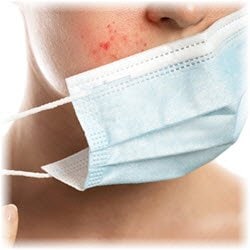How to Treat and Prevent Mask-acne
 Although face masks play an important role in stopping the spread of COVID-19, they can be harsh on some skin types and can cause mask-induced acne, also known as “maskne.” Three common types of skin issues caused by face masks include acne from clogged pores inside the mask area, skin irritation from the mask, allergic reactions to detergent used to wash a fabric mask or dyes or other substances in surgical masks. Red, itching or burning skin can be an indicator of maskne.
Although face masks play an important role in stopping the spread of COVID-19, they can be harsh on some skin types and can cause mask-induced acne, also known as “maskne.” Three common types of skin issues caused by face masks include acne from clogged pores inside the mask area, skin irritation from the mask, allergic reactions to detergent used to wash a fabric mask or dyes or other substances in surgical masks. Red, itching or burning skin can be an indicator of maskne.
Here are some tips on treating and preventing maskne.
- Use a gentle face cleanser and use sunscreen to create a barrier between your skin and mask. When you take off your mask, wash your face and use moisturizer.
- Wash fabric masks every day. Laundry detergents can cause allergic reactions so use fragrance-free detergents if possible.
- Irritated, red, itchy or burning skin should be treated with an over-the-counter hydrocortisone cream once or twice a day. Talk to your dermatologist if the redness or burning gets worse.
- Do not wear makeup under a mask. If you do, be sure it's noncomedogenic which means, specially formulated to not cause blocked pores.
- For severe acne, use an over-the-counter cleanser containing glycolic acid, salicylic acid or benzoyl peroxide. If it doesn't get better after a week or two, see a dermatologist.
Keeping a clean mask and following skin hygiene, will help to control any skin irritations and will also protect yourself and others from COVID-19. To find a PIH Health Dermatologist near you, visit PIHHealth.org/ Dermatology.

SCHEDULE AN APPOINTMENT
Make or request an appointment online with a dermatologist today.
Book Now
More information
The American Academy of Dermatology has more on preventing face mask skin problems.
SOURCE: Cedars-Sinai Medical Group, news release, July 30, 2020
Copyright © 2021 The StayWell Company, LLC. except where otherwise noted.